
A Short Biography
of Carl Austin Rietz
Collector of the Rietz Collection of Food Technology
Foundations
Invoices
and customs papers from the Rietz archive indicate that the 1950s were an intense
period of travel and collecting. Rietz traveled extensively to Africa, the Middle
East and Europe, collecting food-related objects and shipping them back to Mills
College in Oakland. In 1951, Mills President Lynn Townsend White, Jr., appointed
Rietz lecturer in International Cuisine and Food Technology. Two years later,
the "Rietz Food Technology Foundation" was founded at Mills, with what was described
as a "collection in illustration of the progress of science," establishing the
first home for his extensive collection of food-related objects.
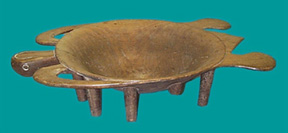
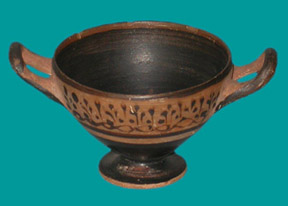
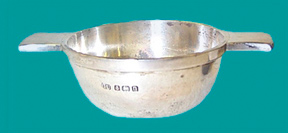
Cups from
the Rietz Collection of Food Technology.
Left: CAS 0389-1442, Samoan or Fiji Islands.
Center: CAS
0389-0076, Classical Greece.
Right: CAS
0389-2016, Warwickshire, England.
The next
few years became a blur of global travel, with crates shipped back to the United
States filled with the fruits of his active collecting in food technology. Ceramics,
textiles, folk art, and books were also collected abundantly. In 1955, Rietz
appeared on San Francisco's KRON television featuring his Collection of Food
Technology. At about the same time, he became the host of thirteen one-hour
radio broadcasts on local station KQED entitled "Food, Fire and Folklore."
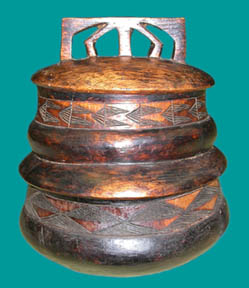
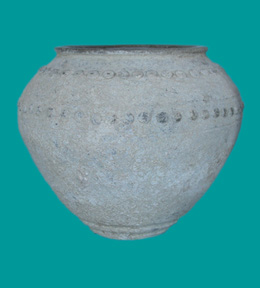
African
and Middle Eastern items from the Rietz Collection of Food Technology.
Left: CAS 0389-1439A-C, East Africa.
Right: CAS 0389-0212, Nihavand, Iran.
Near the
end of the 1950s, Rietz's involvement with Mills College lessened and his interest
began to shift towards the Oakland Public Museum, known today as The Oakland
Museum of California. The papers in the Rietz archive do not give much information
as to why Rietz began to move his collections from Mills to the Oakland Museum.
The first indication of the movement is a document describing the placement
of a culinary prints and illustration collection to the Oakland Museum in 1959.
Rietz may have been interested in the Oakland Museum for reasons including storage
concerns, access to a larger audience, and a professional collections staff,
however there is not sufficient documentation to clearly identify Rietz's reasons
for relocating his various collections.

Click
on the Rietz logo to advance to the next page.






